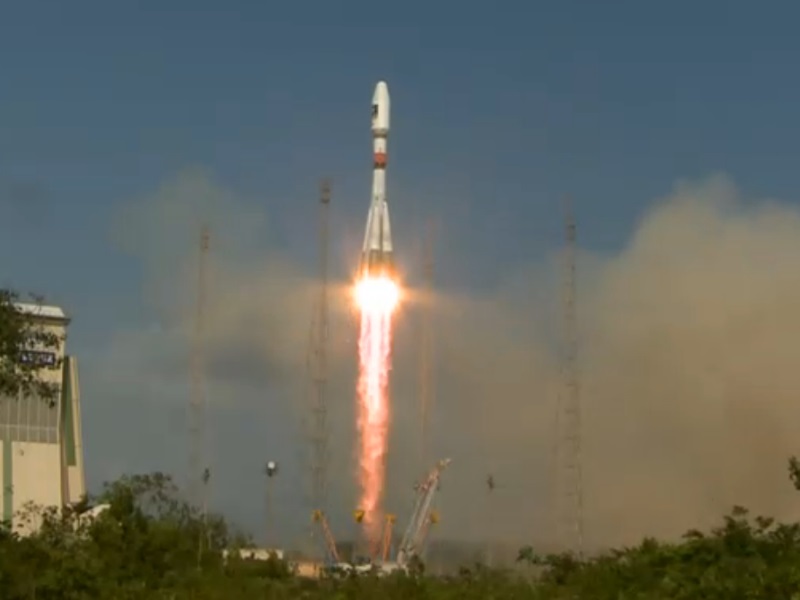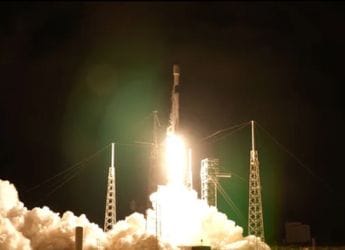- Home
- Science
- Science News
- Europe Launches 2 More Satellites for Galileo Sat Nav System
Europe Launches 2 More Satellites for Galileo Sat-Nav System

Europe on Thursday launched another two satellites for its multi-billion-euro Galileo satnav system, a rival to America's GPS, according to space firm Arianespace.
The launch of satellites 11 and 12 in the Earth-orbiting constellation, brings Europe a step closer to providing initial navigation services next year.
The orbiter duo were taken aloft a Russian Soyuz rocket from Europe's spaceport in Kourou, French Guiana, at 11:51am GMT (5:21pm IST), according to a live broadcast on the website of launch firm Arianespace.
The satellites are due to orbit at an altitude of 23,222 kilometres (14,429 miles).
The project should ultimately comprise 30 orbiters, including a number of spares.
Initial services can start once 16 are in place - hopefully after a four-satellite launch in the second half of 2016, Arianespace chief executive Stephane Israel told AFP this week.
The project, which will also provide crucial search-and-rescue services, has been plagued by delays, technical glitches and budgetary difficulties.
The launch of orbiters seven and eight in March this year was about three months late to allow for a probe into an August 2014 mishap that sent satellites five and six into a lopsided, elliptical orbit.
The pair have since been maneuvered into a better, more circular path.
The mishap was blamed on frozen fuel pipes on board the Soyuz rocket's fourth stage, called Fregat - a problem the European Space Agency says has since been fixed.
The launch of satellites five and six, meant to have been the first fully operational Galileo orbiters, had itself been delayed by more than a year due to "technical difficulties".
The first four orbiters were launched in 2011 and 2012.
The European Commission has budgeted seven billion euros for the project until 2020.
The remaining satellites will be launched using a combination of Soyuz rockets, which can take two into space at a time, and Europe's own Ariane 5 ES launcher, which is being adapted to handle four.
The first Ariane launch is scheduled for be next year, followed by one each in 2017 and 2018.
There will be one Soyuz launch in 2018 as well - bringing the total to 26 satellites, sufficient for full operation.
A decision on additions will be taken next year.
Catch the latest from the Consumer Electronics Show on Gadgets 360, at our CES 2026 hub.
Related Stories
- Samsung Galaxy Unpacked 2025
- ChatGPT
- Redmi Note 14 Pro+
- iPhone 16
- Apple Vision Pro
- Oneplus 12
- OnePlus Nord CE 3 Lite 5G
- iPhone 13
- Xiaomi 14 Pro
- Oppo Find N3
- Tecno Spark Go (2023)
- Realme V30
- Best Phones Under 25000
- Samsung Galaxy S24 Series
- Cryptocurrency
- iQoo 12
- Samsung Galaxy S24 Ultra
- Giottus
- Samsung Galaxy Z Flip 5
- Apple 'Scary Fast'
- Housefull 5
- GoPro Hero 12 Black Review
- Invincible Season 2
- JioGlass
- HD Ready TV
- Laptop Under 50000
- Smartwatch Under 10000
- Latest Mobile Phones
- Compare Phones
- Red Magic 11 Air
- Honor Magic 8 RSR Porsche Design
- Honor Magic 8 Pro Air
- Infinix Note Edge
- Lava Blaze Duo 3
- Tecno Spark Go 3
- iQOO Z11 Turbo
- OPPO A6c
- Lenovo Yoga Slim 7x (2025)
- Lenovo Yoga Slim 7a
- Lenovo Idea Tab Plus
- Realme Pad 3
- Moto Watch
- Garmin Quatix 8 Pro
- Haier H5E Series
- Acerpure Nitro Z Series 100-inch QLED TV
- Asus ROG Ally
- Nintendo Switch Lite
- Haier 1.6 Ton 5 Star Inverter Split AC (HSU19G-MZAID5BN-INV)
- Haier 1.6 Ton 5 Star Inverter Split AC (HSU19G-MZAIM5BN-INV)







![[Sponsored] Haier C90 OLED TV | Dolby Vision IQ, 144Hz OLED and Google TV in Action](https://www.gadgets360.com/static/mobile/images/spacer.png)









